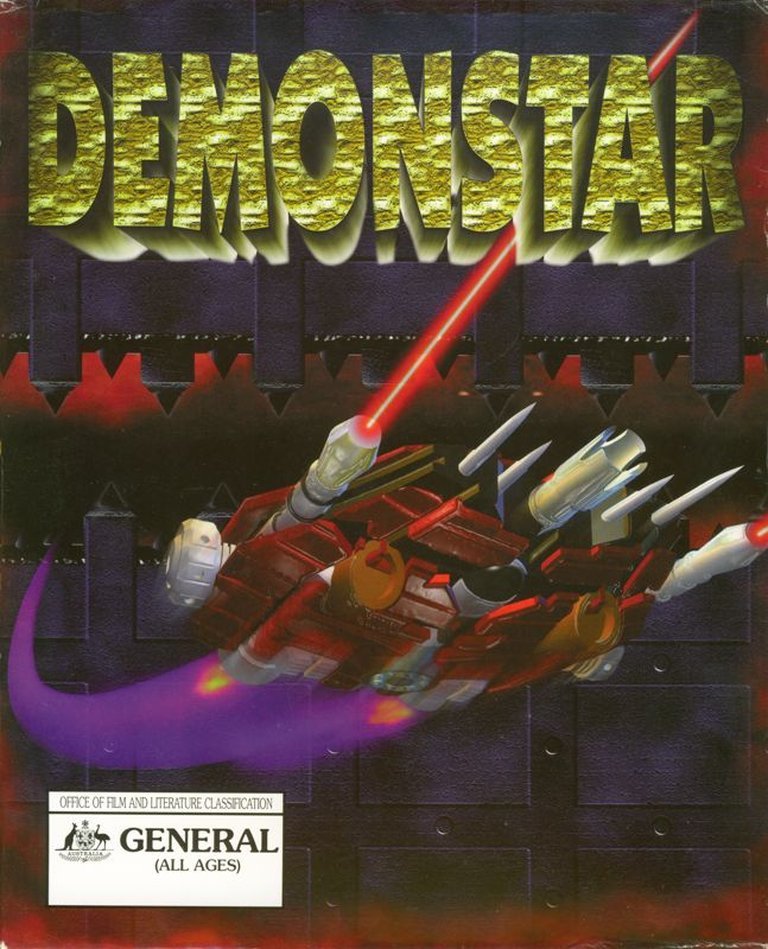- Release Year: 1997
- Platforms: Macintosh, Windows
- Publisher: ionos, Inc., Manaccom Pty Ltd., Mountain King Studios Inc.
- Developer: Mountain King Studios Inc.
- Genre: Action
- Perspective: Top-down
- Game Mode: Online PVP
- Gameplay: Arcade, Shooter
- Setting: Futuristic, Sci-fi
- Average Score: 69/100

Description
DemonStar is a top-down, 2D scrolling arcade shooter set in a sci-fi/futuristic environment, serving as the successor to Raptor: Call of the Shadows and inspired by Raiden. Players pilot a spacecraft through intense waves of enemies, collecting power-ups and engaging in relentless shooting action. The game emphasizes pure gameplay over narrative or technical polish, offering a classic arcade experience with smooth scrolling, internet multiplayer support, and a focus on adrenaline-fueled shooter mechanics.
Gameplay Videos
Where to Buy DemonStar
Patches & Updates
Mods
Guides & Walkthroughs
Reviews & Reception
mobygames.com (68/100): A good diversion… not much more
en.wikipedia.org (94/100): DemonStar received mixed reviews upon release, with reviewers divided on the merits of the simplicity of its gameplay.
gamespot.com (47/100): A bit of advice: Save your cash and just download the shareware version of Raptor – you’ll have a lot more fun.
DemonStar: Review
Introduction
DemonStar is a cult classic in the realm of arcade-style shooters. Heralded as the successor to Raptor: Call of the Shadows, it delivers fast-paced space combat with smooth scrolling and addictive gameplay. However, it’s marred by mediocrity in graphics, music, and depth compared to genre standouts like Tyrian or the Raiden series. This review dissects why DemonStar is a competent but ultimately forgettable entry in the pantheon of space shooters.
Development History & Context
Developed by Mountain King Studios in 1997, DemonStar was the brainchild of Scott Host and Kevin Blackman. The studio sought to create a top-down shooter in the tradition of Raiden, leveraging their experience from Raptor. Technological constraints of the era meant the game used 2D sprites with pre-rendered 3D backgrounds, running on Windows 95/98 with DirectX 3. This limited graphical fidelity but allowed for smooth animations and performance.
Narrative & Thematic Deep Dive
The plot is straightforward: Earth’s Terran Fleet is attacked by the Xidus Armada, and the player must pilot the RaptorX prototype to destroy the DemonStar superweapon. The narrative lacks depth, focusing on action over story. Thematic elements revolve around space combat heroism and overcoming insurmountable odds, typical for the genre but lacking uniqueness.
Gameplay Mechanics & Systems
DemonStar excels in gameplay. Core mechanics involve collecting power-ups for weapons (proton laser, ion cannon, plasma cannon, magnetic pulse), bombs (mega, scatter, mega pulse), and shields. Side and rear shooters add strategic depth. Boss battles are intense but repetitive. The game loops infinitely after level 18, increasing difficulty each loop. Cooperative play and a unlockable level editor enhance replay value.
World-Building, Art & Sound
Visually, DemonStar features neon-colored sprites and space/planet backgrounds. While visually appealing in motion, the static graphics appear dated compared to contemporaries. The soundtrack by Bobby Prince is competent but forgettable, with generic shooter sounds effects. The overall atmosphere is tense but lacks immersion due to minimal environmental detail and storytelling through visuals.
Reception & Legacy
Upon release, DemonStar received mixed reviews. Critics praised the intense gameplay and smooth scrolling but criticized technical shortcomings and lack of innovation. The 2023 remaster improved graphics and sound, but the core experience remained unchanged. Its legacy is as a competent shooter for fans of the genre, spawning two spin-offs and a cult following but failing to achieve broader acclaim.
Conclusion
DemonStar is a solid entry in the space shooter genre, offering engaging gameplay marred by mediocre presentation and shallow progression. It’s a good diversion but lacks the polish and depth needed for lasting appeal. For those seeking nostalgic arcade thrills, it’s worth a play, but modern alternatives may deliver a more rounded experience.